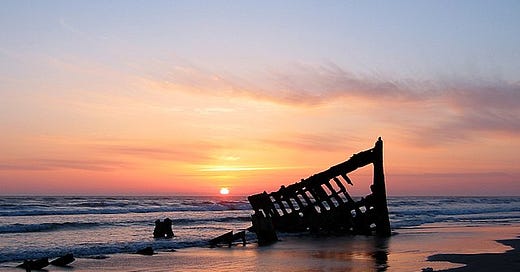Where other men saw dawn breaking, Matthew Arnold saw a shadow creeping over the horizon. The closing of his 1867 poem Dover Beach still lingers ominously in the mind: “the world, which seems / To lie before us like a land of dreams, / So various, so beautiful, so new, / Hath really neither joy, nor love, nor light, / Nor certitude, nor peace, nor help for pain[.]” A new age of science and enlightenment promised to discredit old traditions and break old chains—but Arnold saw that a world without its past is a world unmoored.
They say it’s always darkest before the dawn. Is the inverse also true? Does a blaze of glory come before nightfall? Aristophanes’ Assemblywomen, his bitterest social satire, ends with a riotous public feast in celebration of a new regime. The Athenians pool their resources by public decree and tuck lustily into the common store, dancing and feasting their way offstage: “soon you’ll see food like you’ve never seen before.”
When the singing ends, questions linger behind like shrouded ghosts: what happens when the grain runs out? What if one man doesn’t want to share his food—or his wife? What will the state do to him? In a mercilessly fiendish act of stagecraft, Aristophanes raises these concerns in earlier scenes but leaves them unresolved, so that the characters’ orgy of delight becomes for us a spectacle of dread.
To this modern observer, the footfalls of Aristophanes’ dancers seem to continue on offstage across a vast distance of time, until they blend seamlessly with the echoing tread of inmates pacing their cells in the Soviet Lubyanka prison. Party’s over, folks: what looked like a glorious communist daybreak turned out to be the last dregs of sunset light, gleaming once before the world went dark.
It’s a cursed prophet who sees the truth of such moments. Aristophanes, Arnold, Whittaker Chambers examining America’s apparent success in the 1950s, William Wordsworth as the French Revolution he admired devolved into bloodshed and war. Benjamín Labatut, in his melancholy book about scientific madness and genius, compares the efflorescence of modern technological achievement to the fruitfulness of a citrus tree before it dies: “when they come to the end of their life cycle, they put out a final, massive crop of lemons…. It’s a strange sight…to see such exuberance before death.”
I remain a resolute opponent of despair in all its forms, and I hate talking as if I know what’s going to happen. I don’t. But I do wonder in the midst of all our Sturm und Drang, the fury of our politics and the maximum volume of our cultural disputes, whether we aren’t living out the end of something. All this passionate intensity—could it be a sign not of what comes next but of what is ending, what will clear the way for something new?
I won’t predict doom, and I won’t predict renaissance either, but I will observe that the world must look very different to high schoolers and middle schoolers than it does to those of us who are used to being in these endless fights of ours. They have lived through a bewildering and disorienting youth punctured by COVID lockdowns and political upheaval; they do not remember 9/11 but they have seen war break out in Europe and watched America stumble its way out of Afghanistan. Polls show that they are more and more politically partisan according to sex, and less and less likely to have sex with one another.
What this looks like to me is a generation living in the wreckage of several cultural revolutions—young men and women who never even got to enjoy the party before waking up with the next day’s hangover. I suspect that as they come of age they will want to clear away much of the mess we’ve made and start fresh, if they can. Since listeners to my own podcast skew young, I feel in a certain sense that part of my life’s work is to offer them the materials for doing so—to put forward ancient ideas and practices that were true and good before modernity went on the fritz.
I think that’s what it will take to make the difference between a disastrous new world and a hopeful one: if the sham wisdom of the last few decades is coming undone, we will all need some other well to draw from. It was Arnold, after all, who talked about cultivating “the best which has been thought and said.” What endures from the past becomes more urgent, not less, as time clears away old mistakes. A time is coming when those of us who have shored fragments against our ruin will need to start building something out of them. And this I will predict: that time is coming soon. It may already be here.
Rejoice evermore,
Spencer




